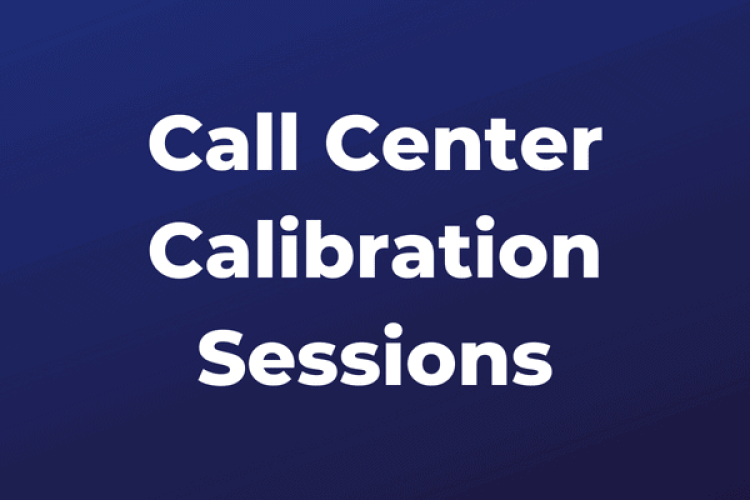When doing live or recorded listening sessions, it is crucial to routinely share your comments with supervisors. You must assist the call center in ensuring the accuracy of its quality measurement procedures. Calibration sessions serve this purpose for call centers. This article decodes the function and best practices for call calibration.
Key Points:
- Call Center Calibration measures how well the call center works as a whole.
- It measures at how well each agent does on their own so that the training and evaluation processes can be changed.
- It sets up the framework for a common customer relationship reference point between the company and the call center, so that the two won’t have different ideas about what “quality” means.
- Call calibration for agents helps you improve your customer service by evaluating call patterns
What is a call calibration?
Call Calibration is the process of screening calls in your customer service system to get a picture of how agents are performing. Then, you can communicate with your agents about what the standards are and discuss them in a transparent way. Call calibration guarantees that all client interactions are handled uniformly and in accordance with a defined preset of quality and performance standards. This means, when supervisors and agent grade the same call to check quality based on client contact, the real scores should be comparable.
By establishing a more uniform review framework, periodic calibration of assessment criteria lowers the disparity between demanding and easy graders. Then, based on the resultant evaluations of sampled calls, you may safely assess the performance of your call center. Additionally, it enables your supervisors to immediately discover areas that needs enhancement.
Call Calibration for Agents
Call calibration for agents helps you improve your customer service by evaluating call patterns and answering the following questions:
- Who on the team needs to take the most action?
- How are they performing compared to the standard you’ve set?
- What needs to happen before you can meet your standards?
- What changes can they make to ensure they reach those standards?
- What changes could be made to improve customer service delivery before meeting your standards?
Calibration Method for agents
Here are the steps we follow to conduct our call calibration reviews:
All agents involved in a particular category of calls are first checked on a monthly basis to ensure consistency in call ratings and response times. The team reviews these ratings with each agent on a monthly basis to verify they’re maintaining the required standards. After reviewing the calls, the team reviews the employee handbook to ensure they’re complying with the standard agents are using. Once this is complete, the team reviews the call logs to ensure they’re maintaining the necessary standards in line with the standard they established for the category of calls.
Repeat for Every Agent in Category of Calls
Calibration is particularly important in customer support, but it can also be used in other settings where agents are interacting with customers and rating calls. This type of process also helps increase the likelihood that you’ll be able to provide consistent and good customer service when your employees are faced with new clients, new skills, and new goals.
Most call centers will have one or more daily calibration reviews, in which an entire team discusses each call and their experience with it. Some call centers will run more frequent or extended calls that include all agents on the team, or a few “tiger teams” that run individual reviews for each agent.
Call calibration sessions
A calibration session is an activity used to unify management ratings and metrics. This workshop brings together at the same table the management of the contact center and the ordering client.
This assessment system includes both inbound and outbound campaigns. The objective is to connect the client’s expectations with the external service provider’s service quality.
A calibration session brings together all call center supervisors and managers. Even though the purpose of these calibration workshops for the various assessors is to match the level of criteria between the customer and the service provider, they provide a number of benefits.
For the call center management teams, a call calibration workshop has various goals, namely:
- Ensure that the measurement is consistent among all evaluators; otherwise, the exercise will be ineffective and the analysis impossible.
- To establish a clear knowledge of the quality requirements
- To develop the customer reference framework
- Determine the training requirements of managers, supervisors and agents
- Challenge the internal processes regarding the obtained data and information
With the NobelBiz OMNI+ Personalized Reports Engine, you can use the power of data to your advantage. Your call center managers and supervisors Get reliable data from a wide range of analytics and reporting tools that give you information about the past and the present that you can change to make detailed performance reports.
Also, the NobelBiz OMNI+ interface is one of the most agent-friendly on the market, seamlessly combining the simplicity of operating calls and interactions with the crisp and precise client data feed. This is a true marvel of efficiency and ergonomics that agents love and get attached to.
The purpose of Call Calibration
In addition to quality monitoring, the calibration call will help you to align customer’s level of criteria with those of the team managers. They enable you to have a shared foundation and speak the same language.
A calibration session brings together the external service provider’s evaluators, notably those responsible for quality assurance.
- Team managers
- Supervisors
- Quality managers
These managers and supervisors are able to discuss the expected level of requirements and examine the outcomes of the various support measures implemented.
What are the benefits of call calibration sessions?
Keep the evaluation consistent
When supervisors look at how their agents interact with clients, they tend to give different scores for things like politeness, helpfulness, and ability to solve problems. It also happens when judging how people act in technical situations. Call calibration makes it easier to judge the quality of customer interactions, no matter what platform or agent was used. It cuts down on favoritism, bias, and judgments that are based on how people feel.
Provide a Comprehensive Understanding of Standards
Companies have long-term goals and plans for the future. But for the organization to reach these goals, everyone has to be on board. Call calibration teaches employees the rules they need to follow so they can do their jobs well.
Enhance call center agents Productivity
Call calibration sessions are also great places for agents to get coaching, especially those who lack certain soft skills or technical behaviors. Call calibration sessions are a good way to get feedback that can be used to improve things. The results of sessions help managers find problems early on and improve their agents’ training so they can do a better job in the future.
The workshop in 5 steps
Not every workshop must follow to the same procedures, yet the core of each session is same. In other words:
- Participants may listen to a recorded call, a live call, or a combination of both.
- Each participant assesses the call using the previously developed and established shared analysis grid.
- In the debriefing, the evaluations are compared. The floor is provided first to the set’s management, then to the client’s representative.
- The rating is given as a statement such as “I found the call to be good/average/poor.”
- Each participant justifies his or her rating by specifying what works and what does not for him or her. They then assign a rating.
 Training shouldn’t just happen when a new employee starts, but should happen all the time through repetition and reinforcement. Even though a company’s environment is always changing, the frontline agents should be able to get the right information. This is Michael Tamer CEO at Proponisi approach on the matter, find out more here!
Training shouldn’t just happen when a new employee starts, but should happen all the time through repetition and reinforcement. Even though a company’s environment is always changing, the frontline agents should be able to get the right information. This is Michael Tamer CEO at Proponisi approach on the matter, find out more here!
Best tips for an excellent call center calibration session
1. Set your calibration sessions on a consistent basis
Indeed, it is good practice to set your calibration sessions on a consistent basis, particularly for new call centers. Even if the environment (offering, processes, etc.) is steady, a quarterly reminder is a good practice.
A calibration workshop allows you to bring together evaluators (team leaders, trainers, field support personnel, quality managers, etc.) for a peer-to-peer interaction that facilitates experience sharing. However, it might be beneficial to occasionally include internal or external customer representatives: this provides an opportunity to recognize the standard’s applicability in all observed scenarios.
Given the technical nature of the objective, this task is frequently delegated to a support department or a manager who will be designated as the subject matter expert.
2. Pick sampled content
We propose that the content of the sampled contacts be made accessible prior to the session by requesting that the participants complete their evaluations prior to the workshop. This has 3 benefits:
- The organizer is aware of the disparities in ratings across evaluators and can properly prepare for the session.
- It also saves meeting time and frees up the workshop for discussion.
- It avoids being affected by others who have talked previously.
If you were unable to have the contact assessed prior to the workshop, here is a suggestion: once the participants have listened to the audio, have them fill out their evaluation grids and swap them with the page next to them to prevent alterations.
It is crucial to ask each participant methodical questions in order to prevent group dynamics or extreme shyness from detracting from the workshop’s aim, which is to determine how each individual interprets and implements the reference framework.
Following the discussion, a reference score is agreed upon for each item; it is not a question of negotiating a middle ground, but rather of establishing the “standard” for the evaluation; consequently, it is crucial to plan the workshop in advance.
3. Leverage your data smartly
The debates are frequently quite informative and occasionally heated. Nonetheless, it is essential to utilize them while keeping in mind the original objectives:
- To detect the gaps between evaluators: the participants with the largest gaps can receive ad hoc help (it can then be determined to particularly sample certain future assessments to ensure the correct grasp of the workshop’s aspects) (counter-evaluation)
- Identify potential flaws in the reference framework: Each workshop is also a case study and may serve as a point of arbitration (to enhance the reference framework or make a decision) with the principal who issued the reference framework.
- Ensure qualitative feedback is provided to the sampled agents: each calibrated contact should be debriefed in order to give specialized help to the adviser in question, taking use of the workshop sessions; To prevent putting the evaluator in a misleading position, care should be taken not to select a contact who has previously been debriefed during the sampling process.
Final point
You must never lose sight of the basic purpose of call calibration sessions, which is to accurately convey to all managers the required level of quality. Throughout the calibration sessions, the rating discrepancies between the customer and service provider must diminish as much as possible.
Each calibration session enables your call to discover the disparities among the agents and develop strategies for those who are farthest from your business goals.

Abdelmounim Benharouga has always had a strong passion for writing and digital marketing. He started as a Digital Content Writer part of marketing department then moved to being Customer Success Manager for the African Region within the Nobelbiz team.



